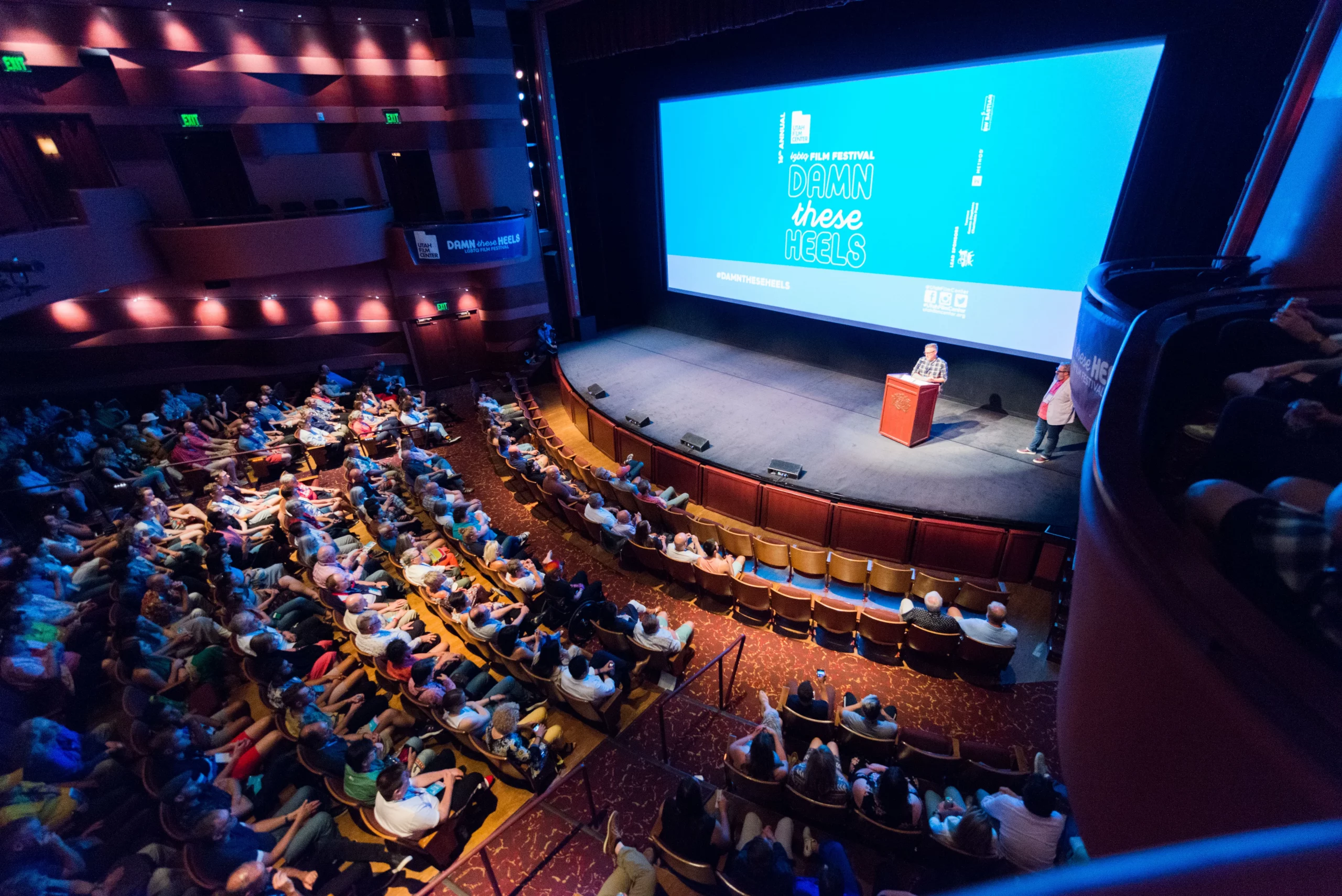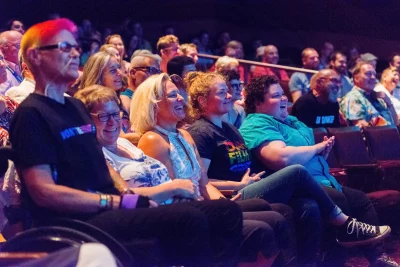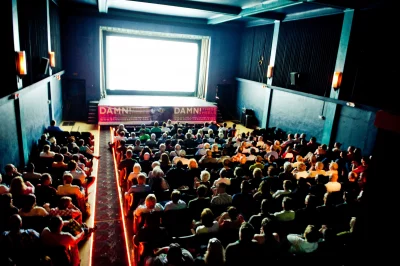
A Celebration of Queer Cinema: Damn These Heels Film Festival
Film
As the longest-running queer film festival in the mountain west, Damn These Heels has continuously pushed boundaries and sparked discussions. From humble beginnings, the festival has become a beacon of equality in Utah and beyond. To celebrate its 20th anniversary, the Damn These Heels Queer Film Festival (or DTH for short), is kicking off with its largest program yet, andt the story of how it came to be is cinematic in its own right.
DTH began in 2003 when the Utah Pride Center approached the Utah Film Center about including a film component at that year’s Pride Week. Mariah M. Mellus, the executive director of the Utah Film Center and the DTH, has overseen and supported the festival as it has expanded. “The festival started with just a couple of films at the city library,” she says. “It grew the following year to be almost a dozen films, and now this year it’s 20 feature films and 20 short films to celebrate the 20th anniversary.”
During its first years, almost all of DTH’s screenings were from the city library’s archives, such as But I’m a Cheerleader and The Adventures of Priscilla, Queen of the Desert. Many of the screenings indulged in campy goodness with attendees decked out in glamorous outfits.This year, the films are all original and come in a range of genres, with many even premiering at DTH. This development has injected a more somber tone into some of the events. Many films center around important, gritty subjects that mainstream studios are unwilling to produce or market. So, while the festival is still a symbol of progress, it is also a reminder of the work that remains.

DTH has also continually transformed to meet the needs of the queer community. Its inception was a unique celebration of queer joy when there were few organizations who even acknowledged the existence of LGBTQ+ individuals in Utah. At a time before Equality Utah even existed, DTH became a safe space for queer individuals. Increasing hostility and a lack of advocacy, meant that the festival grew increasingly political in the 2010s. This hit its peak in 2019, when DTH showed Changing the Game, a gut-wrenching documentary about the lives of trans athletes. In a country that was increasingly passing legislation against such individuals, the film created a nurturing environment for audience members to discuss their traumas as queer individuals and feel supported in a communal space.
As new organizations emerged to fight for equality, DTH has evolved again to embrace the beauty and happiness of the queer community, while also not shying away from the daily hardships and discrimination that they are faced with. This authenticity to the local community has not left DTH, even as it blossomed into a truly spectacular event and outgrew its original location. After a nail-biting search for a larger venue, DTH found a new home at the gorgeous Rose Wagner Theater in 2012, with a red carpet for an extra bit of flair.
The festival has also long encouraged community involvement in every stage of its planning and execution. The programming committee is a team of local critics and advocates who identify as LGBTQ+. They decide which films will be exhibited based on their quality, creativity and how valuable they will be to the queer community in Utah. Jade Velazquez is this year’s Festival Programming Director, and Russell Roots is the Director of Film Exhibition. Drawing on their experiences as critics, creators and members of Utah’s LGBTQ+ population, they ensure that DTH is a festival by and for the queer community.

“When you see yourself in film and you start to identify with it, you start to own it and it becomes part of your culture,” says Mellus. “I think that’s what this festival has been doing over the last 20 years […] claiming these queer stories as part of their culture.” DTH also happily welcomes allies of the LGBTQ+ community as patrons and volunteers. In the past 20 years, DTH has drawn thousands of attendees from all over the world. Mellus says, “There is no one that’s excluded from it—unless they’re coming in with hate.”
The scheduled events at this year’s festival are sure to be exciting for anyone interested in Utah’s local art scene. In addition to the films being screened, workshops on filmmaking will be key events. The first will be an introduction to video self-portraiture, led by queer filmmaker Amanda Madden, while the second will be an in-depth seminar on how to direct films, taught by editor Jack Hessler.
Live performances have also become integral. This year, DTH is featuring the talents of Miss Coco Peru, a renowned drag queen who will be performing and answering questions. “We’ve got a whole bunch of other storytelling artforms on display, too,” Mellus says. “Poetry will be there this year, and we’ve had dance in the past. We also have a lot of visual arts in the space.”
In previous years, DTH has also included some truly legendary figures from queer history. In 2016, they held a discussion panel with Dionne Warwick, a Grammy-nominated singer and staunch advocate for LGBTQ+ rights. The parent organization of DTH, the Utah Film Center, has also interviewed acclaimed Director John Waters.
DTH highlights a spectrum of queer experiences, showcasing both the triumphs and obstacles of marginalized individuals. Films have ranged from slapstick comedies to political dramas and high-quality documentaries. This year, they include a spectrum spanning from a surreal film about queer expression in Russia (Queendom) to a documentary on how a mistranslation may have led to religious discrimination against LGBTQ+ individuals (1946: The Mistranslation That Shifted Culture). Most excitingly, some of the films’ subjects and actors will also appear at DTH to discuss their works, such as Frankie Gonzales-Wolfe (A Run For More) and Miss Coco Peru (Girls Will Be Girls).
DTH will run in-person events from October 12–15, 2023 at the Rose Wagner Theater in downtown Salt Lake City. Additionally, film screenings will take place online from October 15–22. Tickets and event schedules can be found at the Damn These Heels website damntheseheels.org/ or on their Instagram @damntheseheels. To make the festival more accessible, a sliding scale is used for individual ticket pricing. Attendees only have to pay what they can afford.
Anyone interested in submitting a film for next year’s festival can do so at DTH’s online submission portal filmfreeway.com/DamnTheseHeels.
Read more about Damn These Heels! from the past:
Damn These Heels! 2021: Utah’s Top LGBTQ+ Film Festival is Still Running in Heels After 18 Years
Finding A Sweet Cape To Go With Those Heels: Damn These Heels! Film Festival